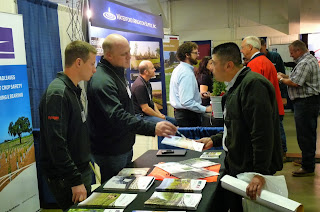COTTON GROWERS URGED TO COMPLETE PLOWDOWN
Fresno County Ag Commissioner Urges Cotton Growers To Complete Plowdown
New laws and regulations on fumigation for Santa Barbara and San Luis Obispo County strawberry growers were in place for the first time this season, and growers did a good job for the most part. This and other topics were discussed at the Wednesday’s annual Strawberry Production and Pest Management Meeting in Santa Maria.
According to Lottie Martin, Ag Biologist, Santa Barbara County Ag Commissioners office, for the most part, grower chose the right tarps for the right situation. “Growers must be careful to use a 60 percent tarp when capping a fumigation with the

Surendra Dara, crop advisor, UC Cooperative Extension, San Luis Obispo
1,3 D,” said Martin. “Growers should plan well in advance to make sure the tarp that is needed, is available.”
Martin said mandated buffer zones were noted and documented, however operators need to do a better job with required signage.
Surendra Dara, a Strawberry and Vegetable Crops Advisor, UC Cooperative Extension, San Luis Obispo, spoke about re-evaluating lygus bug IPM tools in strawberries with a focus on field vacs, monitory and economic thresholds. He spoke of an experiment with softer chemistry such as well as using B. bassiana, a soil fungus that acts as a parasite to lygus. “A combination of B. bassiana and azadirachtin.

Hillary Thomas, research manager, California Strawberry Commission
Hillary Thomas, Research Manager with California Strawberry Commission in Watsonville also spoke about lygus. Her focus was third year bug vac research for lygus control.
Mark Bolda, Strawberry and Caneberry Farm Advisor and County Director with UC Cooperative Extension, Santa Cruz County spoke about strawberry transplanting and the critical importance of chilling hours necessary for strawberry production.
Steve Fennimore, Cooperative Extension Specialist, UC Davis updated attendees on the use of steam to kill soil pathogens, in place of fumigants. He said work is focused on reducing the cost and outlined possible use of a prototype machine around certain higher risk areas near buffer zones on production fields.

Karen Klonsky UC Cooperative Extension specialist
Karen Klonsky, Cooperative Extension Specialist, UC Davis spokes about the economic considerations of alternatives to fumigation and producing a second year crop.
Also speaking was Thomas Flewell, Flewell Consulting, Watsonville-Salinas. His topic focused on evaluating pest management strategies with numbers. What do the numbers mean and how do we really know what we’re doing.
A more detailed report can be found in future issue of Vegetables West Magazine. Free subscription at VegetablesWest.com.
More than 800 growers and PCAs were at the Stanislaus County Fairgrounds TODAY, to hear from many speakers, visit with hundreds of exhibitors, talk about tree nuts and grape vines, and enjoy breakfast and a barbeque Tri-Tip lunch.
 |
| Exhibitors speak with tree nut growers about products and services |

Speakers came from UC Davis, Stanislaus County Ag Commissioner’s office, UC Cooperative Extension, Almond Board of California, California Walnut Board, Stanislaus County Farm Bureau, and CalAgSafety.